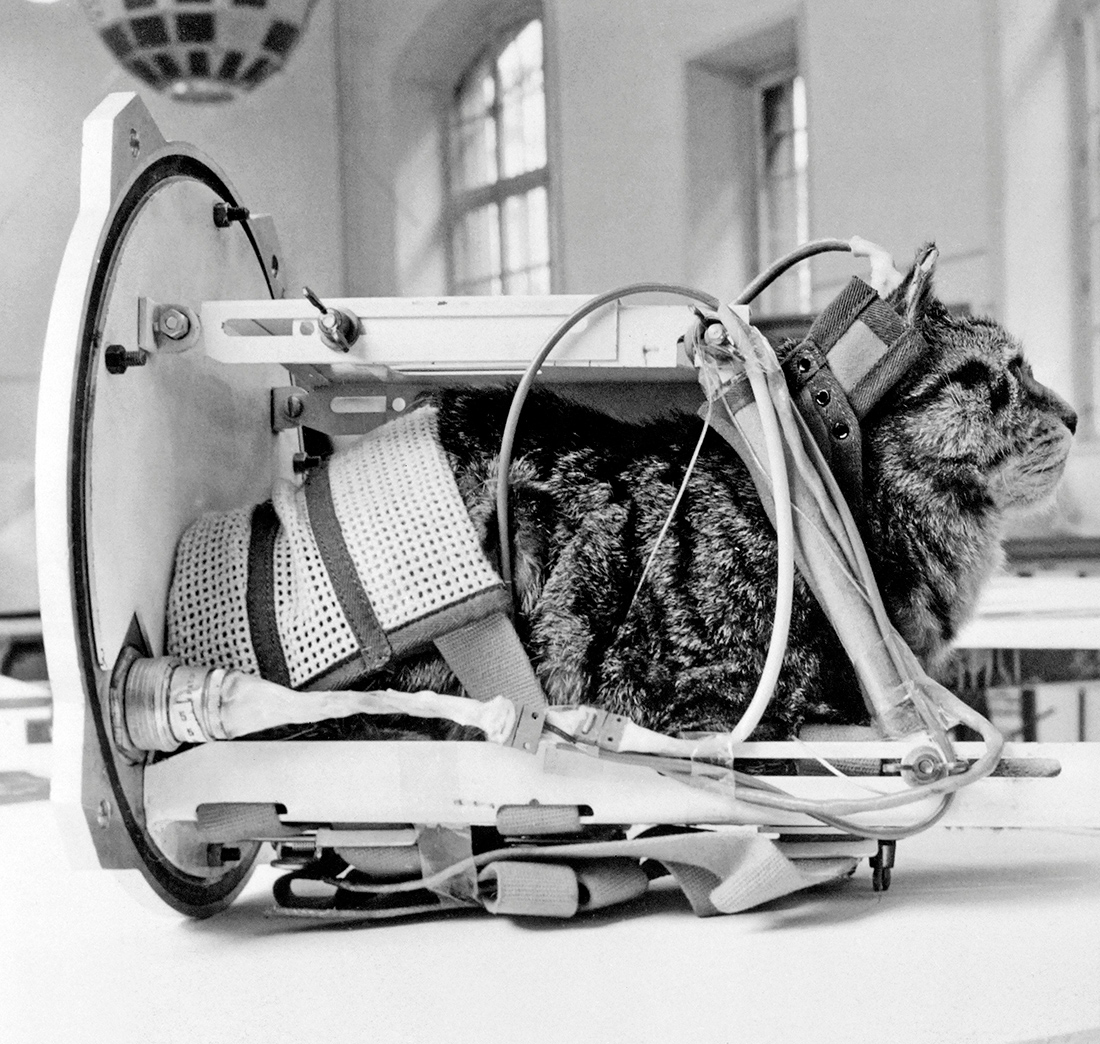First Cat in Space to Receive a Proper Memorial
When it comes to animals that heroically blasted off into space during the space race, names like Laika the dog or Ham the chimpanzee are probably the first that come to mind. But one spacefaring feline who helped to pave the way for humans to go to space has gone largely unrecognized, and a new Kickstarter campaign aims to change that.
On Oct. 18, 1963, a French cat named Félicette became the first and only feline to ever travel to space. She launched atop a Véronique AG1 rocket and flew nearly 100 miles (157 kilometers) above the Earth, where she briefly experienced weightlessness. Her rocket soared up to six times the speed of sound and exposed her to 9.5 g's of force. Fifteen minutes later, she safely returned to Earth by parachuting down in her little space capsule — alive and well.
And just like that, an unsuspecting tuxedo kitty plucked from the streets of Paris became a space cat celebrity. Unfortunately for Félicette, her legacy has long been overshadowed by the many dogs, monkeys and chimps that flew to space in the 1960s. "Over the last 54 years, the story of the first and only cat to go to space has been largely forgotten. She deserves a proper memorial," the Kickstarter page reads. [Animals in Space: 10 Beastly Tales]
Now you can help immortalize this incredible cat by contributing to a fund for a shiny, bronze statue of Félicette to be erected in her hometown of Paris, France.


Depending on how much you're willing to donate, rewards include "autographed" postcards (featuring Félicette's actual pawprint), enamel pin badges, tote bags and printed photographs of Félicette. The most generous donors will have their names included on a plaque by the statue and will be given a small replica of the statue.
"The first chimp in space is buried at the International Space Hall of Fame. The first dog in space is immortalized in bronze. The first cat has nothing," an unnamed narrator says in the Kickstarter campaign's video. Félicette may have made headlines that can forever be located in old newspaper archives, but so far, there is no permanent memorial for this cosmic cat.
Félicette was one of 14 cats selected by the French space program to undergo spaceflight training. Her participation in the space race was certainly not voluntary, but it was a huge milestone for France, which had just established the world's third civilian space agency (after the U.S. and the Soviet Union). Félicette's mission helped bring France into the space race.
Get the Space.com Newsletter
Breaking space news, the latest updates on rocket launches, skywatching events and more!
"Back then, scientists around the world wanted to understand how the lack of gravity could affect animals — the idea being, if they can survive in space, then so can humans. In fact, these cats went through the same intensive training as human astronauts," the video states.
That training involved the same kind of centrifuge that human astronauts sit in during their preflight training. The cats also had electrodes implanted into their brains so scientists could monitor their neurological activity.
"Ultimately, it was Félicette who was chosen for the mission, due to her calm disposition," the video states, "though some reports say it was because all the other cats had put on too much weight." [Pioneering Animals in Space in Pictures]
Other reports insinuate that Félicette was actually a backup cat for another cat named Félix, who escaped on the day of his flight. However, others have offered a different explanation for Félix the cat.
According to the video, the memory of Félicette has been "further obscured, as a series of commemorative stamps all assumed she was a male cat named Félix. Seems the common misconception that only men are leading the fields of science and engineering applies to cats, too. It's Félicette's contributions to spaceflight research that will one day allow us to take our cats to the Martian colonies and beyond. For that, she deserves her rightful recognition."
To contribute to Félicette's memorial, visit the Kickstarter page by Nov. 17, 2017. You can donate as little as 1 euro (about $1.33), but to get any space cat swag, you'll need to donate at least 10 euros (about $13).
Email Hanneke Weitering at hweitering@space.com or follow her @hannekescience. Follow us @Spacedotcom, Facebook and Google+. Original article on Space.com.
Join our Space Forums to keep talking space on the latest missions, night sky and more! And if you have a news tip, correction or comment, let us know at: community@space.com.

Hanneke Weitering is a multimedia journalist in the Pacific Northwest reporting on the future of aviation at FutureFlight.aero and Aviation International News and was previously the Editor for Spaceflight and Astronomy news here at Space.com. As an editor with over 10 years of experience in science journalism she has previously written for Scholastic Classroom Magazines, MedPage Today and The Joint Institute for Computational Sciences at Oak Ridge National Laboratory. After studying physics at the University of Tennessee in her hometown of Knoxville, she earned her graduate degree in Science, Health and Environmental Reporting (SHERP) from New York University. Hanneke joined the Space.com team in 2016 as a staff writer and producer, covering topics including spaceflight and astronomy. She currently lives in Seattle, home of the Space Needle, with her cat and two snakes. In her spare time, Hanneke enjoys exploring the Rocky Mountains, basking in nature and looking for dark skies to gaze at the cosmos.









